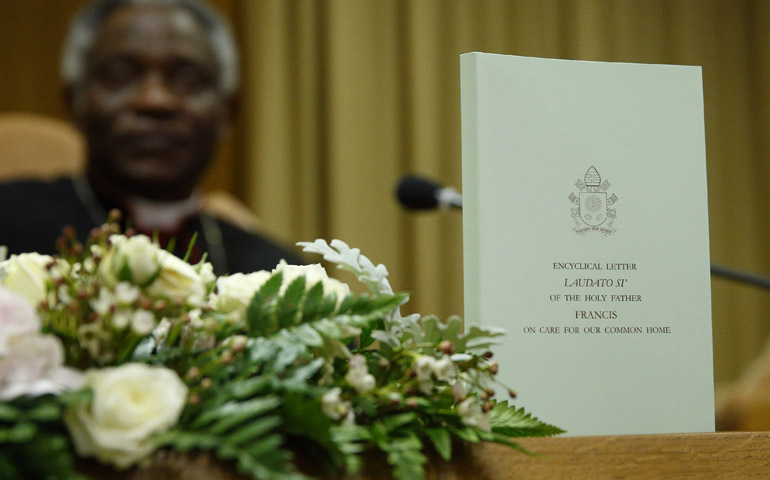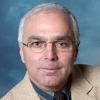
The English edition of Pope Francis' encyclical on the environment at a news conference June 18 at the Vatican. At left is Cardinal Peter Turkson, president of the Pontifical Council for Justice and Peace. (CNS/Paul Haring)
It's courageous, it's prophetic, it's challenging, it's holistic, it's wonderful: That's what I think of Pope Francis' environmental encyclical, "Laudato Si', on Care for Our Common Home."
Quoting his patron saint, Francis of Assisi, who is also the patron saint of ecology, Pope Francis begins his papal letter with a beautiful verse from the saint's "Canticle of the Creatures": "Praise be to you, my Lord, through our Sister, Mother Earth, who sustains and governs us, and who produces various fruit with coloured flowers and herbs."
"Saint Francis of Assisi reminds us," writes the pope, "that our common home is like a sister with whom we share our life and a beautiful mother who opens her arms to embrace us. ...
"This sister now cries out to us because of the harm we have inflicted on her by our irresponsible use and abuse of the goods with which God has endowed her. We have come to see ourselves as her lords and masters, entitled to plunder her at will."
Pope Francis explains, "Each year hundreds of millions of tons of waste are generated, much of it non-biodegradable, highly toxic and radioactive, from homes and businesses, from construction and demolition sites, from clinical, electronic and industrial sources. The earth, our home, is beginning to look more and more like an immense pile of filth."
The Holy Father then weighs in on climate change. Ignoring the weak scientific claims of those who deny the climate is changing and that the earth is warming principally because of human pollution, he writes, "A very solid scientific consensus indicates that we are presently witnessing a disturbing warming of the climatic system."
Indeed, the scientific consensus is very solid. According to NASA, "97 percent or more of actively publishing climate scientists agree: Climate-warming trends over the past century are very likely due to human activities."
Pope Francis continues, "In recent decades this warming has been accompanied by a constant rise in the sea level and, it would appear, by an increase of extreme weather events ... Humanity is called to recognize the need for changes of lifestyle, production and consumption, in order to combat this warming."
"The problem is aggravated by a model of development based on the intensive use of fossil fuels" -- that is, coal, oil and gas.
The pope urgently calls for global conversion from the use of these fossil fuels to "clean and renewable energy" -- wind, solar and geothermal.
"[Climate change] represents one of the principal challenges facing humanity in our day. Its worst impact will probably be felt by developing countries in coming decades." For example, "there has been a tragic rise in the number of migrants seeking to flee from the growing poverty caused by environmental degradation."
"The warming caused by huge consumption on the part of some rich countries has repercussions on the poorest areas of the world, especially Africa, where a rise in temperature, together with drought, has proved devastating for farming," Francis writes.
"Many of those who possess more resources and economic or political power seem mostly to be concerned with masking the problems or concealing their symptoms, simply making efforts to reduce some of the negative impacts of climate change."
In a rebuke to some multinational corporations operating in economically underdeveloped countries, Francis writes, "Generally, after ceasing their activity and withdrawing, they leave behind great human and environmental liabilities such as unemployment, abandoned towns, the depletion of natural reserves, deforestation, the impoverishment of agriculture and local stock breeding, open pits, riven hills, polluted rivers and a handful of social works which are no longer sustainable."
Francis then turns his attention to the growing scarcity of clean water, especially in Africa, and the reckless pollution of much of our existing water. And he writes about his concern regarding the privatization of water -- "turning it into a commodity subject to the laws of the market."
"Our world has a grave social debt towards the poor who lack access to drinking water," Francis says.
The pope expresses deep concern that the many injustices of market-based economies, together with environmental degradation, have their gravest effects on the poor and vulnerable.
He writes, "The depletion of fishing reserves especially hurts small fishing communities without the means to replace those resources; water pollution particularly affects the poor who cannot buy bottled water; and rises in the sea level mainly affect impoverished coastal populations who have nowhere else to go."
Francis tries to awaken the consciences of all, especially the economically and politically powerful, to the plight of the poor.
He writes that in political and economic discussions, the poor seem to be brought up as an afterthought. "Indeed, when all is said and done, they frequently remain at the bottom of the pile."
Francis astutely observes that living comfortable lifestyles far removed from the poor often leads to a "numbing of conscience" and to a cold, impersonal analysis. "At times this attitude exists side by side with a 'green' rhetoric.
"Today, however, we have to realize that a true ecological approach always becomes a social approach; it must integrate questions of justice in debates on the environment, so as to hear both the cry of the earth and the cry of the poor."
Observing the connection between the degradation of the environment and war, Francis writes, "It is foreseeable that, once certain resources have been depleted, the scene will be set for new wars."
Pope Francis says in addition to highlighting the duty of each person to care for nature, the church "must above all protect mankind from self-destruction."
The Holy Father sees the environmental problem as part of a much larger, more serious problem: Our failure to consistently recognize the truth that everyone and everything is interconnected.
He explains, "When we fail to acknowledge as part of reality the worth of a poor person, a human embryo, a person with disabilities -- to offer just a few examples -- it becomes difficult to hear the cry of nature itself; everything is connected."
"Since everything is interrelated, concern for the protection of nature is also incompatible with the justification of abortion," he writes.
Pope Francis sees in St. Francis a perfect example of one who fully understood our interrelatedness.
He writes that St. Francis "was a mystic and a pilgrim who lived in simplicity and in wonderful harmony with God, with others, with nature and with himself. He shows us just how inseparable the bond is between concern for nature, justice for the poor, commitment to society, and interior peace."
Pope Francis has given the world a great gift. With wise insight, he has laid out for us the truth of our interconnectedness with all creation -- not only in the ecological web of life, but as people sharing one human nature and, spiritually, as brothers and sisters united to God, father of all.
However, because we continue to ignore the vital necessity of nurturing this interconnectedness, the ecological, social and spiritual web is tearing.
But if we care at all, we still have a little time to mend the tears.
For anyone interested in being a part of the solution, "Laudato Si', on Care for Our Common Home" is a must-read!
[Tony Magliano is an internationally syndicated social justice and peace columnist. He is available to speak at diocesan or parish gatherings about Catholic social teaching. His keynote address, "Advancing the Kingdom of God in the 21st Century," has been well received by diocesan gatherings from San Clemente, Calif., to Baltimore. His email address is tmag@zoominternet.net.]
Editor's note: We can send you an email alert every time Tony Magliano's column, "Making a Difference," is posted. Go to this page and follow directions: Email alert sign-up.




